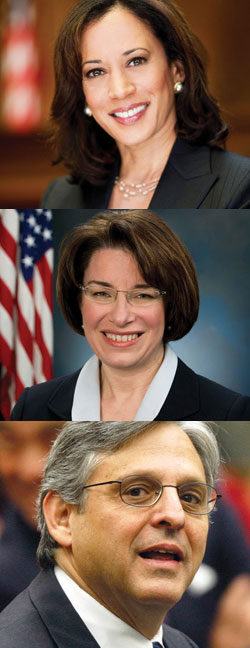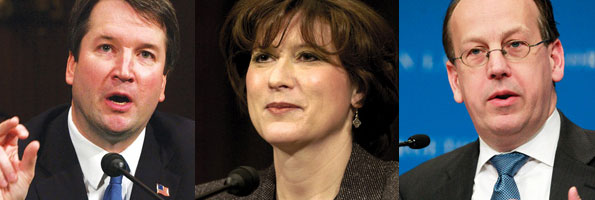Youth Will Out: No Matter Who Wins, SCOTUS Nominees Will Get Younger

OBAMA PICKS: Kamala Harris, Amy Klobuchar, Merrick Garland
Voters won’t be punching chads or hitting touch screens with the names of U.S. Supreme Court nominees on Nov. 6. But with three justices in their late 70s and a fourth in his mid-70s, chances are strong that a second-term Barack Obama or a first-term Mitt Romney will have the opportunity to nominate one or more replacements. Already, many in legal and political circles have drawn up lists of potential nominees.
“The Supreme Court is essentially going to be on the ballot this November,” says Margery F. Baker, executive vice president of People for the American Way, a liberal group based in Washington, D.C. “We want to make sure people understand the stakes.”
Clint Bolick, a conservative legal activist at the Goldwater Institute in Phoenix, says that “justices long outlive the presidential administrations during which they are named. It is truly the most lasting legacy a president can have.”
Bolick is the author of a new book, Two-Fer: Electing a President and a Supreme Court. He notes that not since Clarence Thomas succeeded Thurgood Marshall on the court in 1991 has there been a case of a liberal being replaced by a conservative or vice versa.
“The shift of a single justice could tilt the court’s balance sharply to the left,” Bolick writes of a possible Obama second term. Of course, a Romney presidency could mean solidifying the court’s conservative majority for years to come.
But a number of factors could combine to make the future of the high court a more salient issue this fall.
A DIFFERENT LANDSCAPE
During President Obama’s term, the Supreme Court has issued divisive opinions on campaign finance, the Affordable Care Act and state immigration measures, and the president has not shied away from making the court an issue. Meanwhile, the court’s next term already includes a high-wattage case on affirmative action in higher education, and it could bring cases dealing with another hot-button issue: gay marriage.
“Because of what some people see as political decisions by the court, and the impact that its decisions can have on their lives, I think it’s a different landscape this year,” says Baker of People for the American Way. The group has launched a website aimed at drawing attention to Romney’s potential impact on the court.
For example, Romney chose Robert H. Bork, the controversial high court pick of President Ronald Reagan whose nomination was defeated in 1987, as a judicial adviser during the heat of the Republican primary last year, at a time he was striving to establish his bona fides with conservatives. So the PFAW site, RomneyCourt.com, imagines the potential impact of Romney picking Bork for the court.
Romney’s campaign says that if elected, the Republican will nominate people in the mold of the court’s four more conservative members: Chief Justice John G. Roberts Jr. and Associate Justices Antonin Scalia, Clarence Thomas and Samuel A. Alito Jr. (swing Justice Anthony M. Kennedy is pointedly not mentioned).
But the role of Bork might be vulnerable to attack from the Obama campaign. “And it may not be something that appeals to independent voters,” says Adam Winkler, a liberal-leaning law professor at the University of California at Los Angeles.
Curt Levey, the president and executive director of the Committee for Justice, a D.C.-based conservative group focused on judicial nominations, says that if Romney is elected, Bork won’t be taking a full-time job in the White House advising the president on court picks.
“At the end of the day, other than symbolically, the fact that Bork is on [Romney’s judicial advisory panel] is not going to make a difference,” Levey says.
With two Supreme Court nominations under his belt, Obama has a more direct record on the issue, observers note. Sonia Sotomayor and Elena Kagan represented a commitment to greater ethnic and gender diversity while also bringing moderate, but not stridently liberal, views.
Putting aside basic qualifications such as relevant legal experience, the top consideration for Supreme Court nominees these days is age, observers say. The sweet spot will be 45 to 55 years old. Justice Ruth Bader Ginsburg, at age 60 when she was nominated in 1993, was the last to join the court having hit that milestone, although Harriet Miers was 60 in 2005 when President George W. Bush nominated and later withdrew her name amid a revolt among conservatives in his party.
“If you’ve been on the [potential nominees] list already, you are unlikely to still be on that list” when the next seat comes open, Winkler says. “The only certainty about the next Supreme Court pick is that he or she will be young.”
Supreme Court litigator Tom Goldstein, publisher of SCOTUSblog, says that “Republicans in particular really value youth [for high court picks]. I don’t see them putting up someone older than 53 at nomination.”

ROMNEY PICKS: Brett Kavanaugh, Diane Sykes, Paul Clement
Sidebar
Names of Potential Nominees That Are Bubbling to the Surface
For Barack Obama:
Kamala Harris, 47, attorney general of California. This is the top prospect for Tom Goldstein, who loves handicapping such discussions and correctly predicted the nomination of Elena Kagan well before she was announced. Goldstein’s theory is that Justice Ruth Bader Ginsburg would be the most likely retiree under a second Obama term and Harris, a biracial former local prosecutor, would be a good fit.
Amy Klobuchar, 52, a U.S. senator from Minnesota and member of the Judiciary Committee. Also a former local prosecutor, Klobuchar is high on many observers’ lists as one who would bring long-lacking elective and legislative experience to the court. But she may be too valuable for maintaining Democratic control of the Senate to risk appointing her to the court.
Jacqueline H. Nguyen, 46, recently confirmed to the 9th U.S. Circuit Court of Appeals at San Francisco, emigrated from Vietnam at age 10 and has been a prosecutor and a federal district judge.
Deval Patrick, 56, the governor of Massachusetts and a former assistant U.S. attorney general for civil rights under President Bill Clinton.
Others on the list include two of Obama’s finalists for first-term vacancies: Merrick B. Garland, 59, of the U.S. Court of Appeals for the District of Columbia Circuit; and Sidney R. Thomas, who turns 59 in August, of the 9th Circuit. Both would stretch the age rule to the limit. Also, Homeland Security Secretary Janet Napolitano, 54; Lisa Madigan, 46, attorney general of Illinois; Caitlin Halligan, 45, recently renominated to the D.C. Circuit; and Goodwin H. Liu, 41, of the California Supreme Court, a liberal whose nomination to the 9th Circuit was bottled up by Republicans.
For Mitt Romney:
Paul D. Clement, 46, a former U.S. solicitor general under the second President Bush and now a high-profile Supreme Court litigator. Clement is at the top of many Republicans’ list for his keen intellect and his conservative credentials. But some see his willingness to take on the most divisive of hot-button issues—the challenge to the health care law, the defense of the federal law that does not recognize gay marriage—as something that might make any nomination of him subject to the political climate, such as whether Republicans were able to take control of the Senate.
Brett M. Kavanaugh, 47, a judge on the D.C. Circuit and a former assistant to Whitewater independent counsel Kenneth W. Starr, is another favorite among conservatives.
Diane S. Sykes, 54, a judge on the 7th U.S. Circuit Court of Appeals at Chicago. Conservatives like her 2011 opinion for a 7th Circuit panel that rejected the city of Chicago’s ban on gun ranges.
Neil M. Gorsuch, who turns 45 in August, a judge on the 10th U.S. Circuit Court of Appeals at Denver.
Jeffrey S. Sutton, 51, a judge on the 6th Circuit at Cincinnati. The former Scalia clerk has been a darling of conservatives, but his concurring opinion last year upholding the Affordable Care Act has led some to cross Sutton off their lists.
Others mentioned as possibilities under Romney include Don R. Willett, 46, of the Texas Supreme Court; Viet Dinh, 44, a law partner of Clement’s and a native of Vietnam; Michael W. McConnell, 57, a former judge on the 10th Circuit and a leading constitutional scholar on religion and other issues.
The counterpart to Goodwin Liu on the Democratic list is Miguel Estrada, 50, the Washington lawyer whose nomination to the D.C. Circuit by President Bush was filibustered by Democrats.



